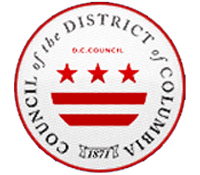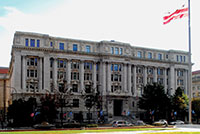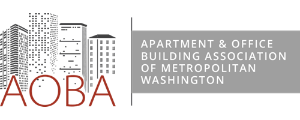District of Columbia At Issue - November 2020
Multifamily/Commercial
Discuss Property Tax Issues with District’s CFO Jeff DeWitt at Briefing on Nov. 18
 Join colleagues on Wednesday, Nov. 18 at 10:00 am as AOBA hosts a Member Briefing with the District’s Chief Financial Officer Jeff DeWitt. Registration is open for the live Zoom event.
Join colleagues on Wednesday, Nov. 18 at 10:00 am as AOBA hosts a Member Briefing with the District’s Chief Financial Officer Jeff DeWitt. Registration is open for the live Zoom event.
Member Action: Members are asked to provide questions or topics for discussion via email by the close of business on Monday, Nov. 17. Please email Eric J. Jones, MSF.
A Potential Big Deal: Council Hearing on Bill to Provide Job Protection for Employees Laid Off During COVID-19
 The DC Council held a November 4th hearing on Bill 23-965, the “Displaced Workers Rights to Reinstatement and Retention Amendment Act of 2020”. As originally introduced, the legislation was designed to extend the 18-month period for workers covered under the Displaced Workers Protection Act of 2014, which covers workers in the hospitality industry. Under this act, workers covered by Collective Bargaining Agreements are provided with an 18-month callback period when their businesses are closed.
The DC Council held a November 4th hearing on Bill 23-965, the “Displaced Workers Rights to Reinstatement and Retention Amendment Act of 2020”. As originally introduced, the legislation was designed to extend the 18-month period for workers covered under the Displaced Workers Protection Act of 2014, which covers workers in the hospitality industry. Under this act, workers covered by Collective Bargaining Agreements are provided with an 18-month callback period when their businesses are closed.
While the legislation as introduced would not have a major impact on AOBA members, the council is seeking to amend the legislation during the upcoming mark-up, scheduled for early December 2020. Under the proposed expansion, the protections mentioned above would potentially be expanded to all DC employees. This concerns AOBA members because it would (a) require companies to guarantee employment protection for all employees laid off during the COVID-19 pandemic and (b) require companies to follow union rules even if impacted employees are not organized.
While AOBA did not provide testimony during the Nov. 4 hearing, we will provide a written statement prior to the record closing on November 18. In addition, AOBA is working with other impacted business groups including the DC Chamber, the Hotel Association, the Hospital Association and the Restaurant Association of Metro Washington, and may submit a joint letter in opposition.
Member Action: During the hearing, Council Chairman Phil Mendelson stated that he plans to mark up the bill during the Council’s December meeting and move the legislation before year’s end. AOBA will continue to monitor the legislation and provide updates. Questions about this bill? Contact Eric J. Jones, MSF.
Commercial
Potential Tax Benefits for Commercial Members in Legislation for Legacy Businesses
 On October 30 the Council’s Committee on Business & Economic Development marked up B23-0432, the “Protecting Local Area Commercial Enterprises Amendment Act of 2019,” which subsequently passed on first reading on November 10. While AOBA did not testify at the legislation’s first hearing held back in October 2019, the legislation, under the required Legacy Lease and Renewal Program, would provide potential tax benefits for commercial landlords. As drafted the legislation would require the District to develop a legacy support program that provides grants of $50,000 for “improvement stabilization” and other incentives. In addition, it would create a ten percent real property tax rebate for taxes paid by legacy businesses or their landlords. While the rebate is capped at $1,890 in year one, it would be indexed to inflation in subsequent years. Note: Legacy businesses are defined as independent, small and locally owned DC businesses in operation for at least 15 years.
On October 30 the Council’s Committee on Business & Economic Development marked up B23-0432, the “Protecting Local Area Commercial Enterprises Amendment Act of 2019,” which subsequently passed on first reading on November 10. While AOBA did not testify at the legislation’s first hearing held back in October 2019, the legislation, under the required Legacy Lease and Renewal Program, would provide potential tax benefits for commercial landlords. As drafted the legislation would require the District to develop a legacy support program that provides grants of $50,000 for “improvement stabilization” and other incentives. In addition, it would create a ten percent real property tax rebate for taxes paid by legacy businesses or their landlords. While the rebate is capped at $1,890 in year one, it would be indexed to inflation in subsequent years. Note: Legacy businesses are defined as independent, small and locally owned DC businesses in operation for at least 15 years.
To qualify for the incentive, property taxes must be paid by September 15 of the application year with the rebate paid by the DC government no later than December 15. The Department of Small and Local Business Development must certify the property and taxpayer to which the rebate applies with OTR. Further, when entering or renegotiating a lease with a legacy business, the bill requires commercial property owners provide an opportunity for a legacy business to re-negotiate the lease at a price and term not to exceed 51 percent of its overall business expenses. Finally, the law provides that if a landlord has received any financial assistance under the program, and sells the property, that the legacy business has the first right of refusal.
Member Action: While the legislation is expected to pass on second reading, the program is still subject to appropriation since it has an expected fiscal impact of $27.8 million for FY 2021 and a total of $111 million for FY 2021 – FY 2024. Members with questions about the bill should contact Eric J. Jones, MSF.
Multifamily
Council Holds Marathon Hearing on Rent Control Expansion
 On November 9, the DC Council Committee on Housing and Neighborhood Revitalization held a virtual public hearing on two rent control reform bills, the “Hardship Petition Process Reform Amendment Act of 2020” (Bill 23-972) and the “Rent Stabilization Program Expansion and Reform Amendment Act of 2020” (Bill 23-873), which is also known as the Rent Control Omnibus bill. AOBA testified at the 10-hour hearing that drew 170 public witnesses, which included 35 AOBA witnesses from 15 separate firms representing the multifamily rental industry. Our strategic partners - DCBIA, SMOA, and United Bank - also presented testimony in opposition to the bills.
On November 9, the DC Council Committee on Housing and Neighborhood Revitalization held a virtual public hearing on two rent control reform bills, the “Hardship Petition Process Reform Amendment Act of 2020” (Bill 23-972) and the “Rent Stabilization Program Expansion and Reform Amendment Act of 2020” (Bill 23-873), which is also known as the Rent Control Omnibus bill. AOBA testified at the 10-hour hearing that drew 170 public witnesses, which included 35 AOBA witnesses from 15 separate firms representing the multifamily rental industry. Our strategic partners - DCBIA, SMOA, and United Bank - also presented testimony in opposition to the bills.
Since the Rent Control Omnibus bill also includes similar language from the Hardship Petition Reform bill, housing providers’ prime focus was on Bill 23-873, which seeks to impose the following radical policy proposals:
- Significantly reduce rental income needed to maintain older properties by:
- reducing annual increases to just CPI;
- eliminating vacancy increases;
- repealing the use of voluntary agreements; and
- restricting the use of housing provider petitions.
- Expand rent control to:
- buildings constructed after 2005;
- housing providers with four or more rental units; and
- any building that is 15 years or older that is tied to a dynamic rolling date.
If implemented, these proposed changes to the existing rent control law will devastate the multifamily rental housing market – already struggling due to the pandemic, and negatively impact the ability to preserve the District’s aging rental housing stock.
After the hearing, the Committee stated that neither bill is expected to advance until sometime in the new year. Additionally, the Committee agreed that before advancing any legislation, they would launch a robust and deliberative discussion about rent control reforms with all stakeholders, as was originally promised before the COVID-19 pandemic mothballed that planned assemblage.
Member Action: DC Council needs to hear from AOBA members about the real impact of these bills. We are asking our membership to engage with our email advocacy campaign by sending a letter of opposition to the DC Council about the negative impacts of Bill 23-873 and Bill 23-972. Click here to send a letter of opposition. If you have any questions about the Rent Control Omnibus bill, please contact Randi Marshall.
End of Year Sparks Rush of Legislative Activity on Housing Bills
As the end of 2020 looms, DC Councilmembers have been eager to get hearings scheduled and hold committee votes before December 31 when the two-year Council Period ends. Fortunately, even though there’s been a rush of activity, none of the pending bills are expected to move to a full Council vote before year’s end. These actions are more like an administrative “purge” to close out Committee legislative portfolios and set-up any outstanding bills for advancement in the new Council Period.
Councilmembers have held a committee vote on two bills and held five hearings on 11 bills over the last eight weeks, which are all relevant to multifamily rental housing:
Committee Votes
November 9 – Committee on Transportation and the Environment
- Indoor Mold Remediation Enforcement Amendment Act of 2019 (B23-132)
- Lead Hazard Prevention and Elimination Amendment Act of 2019 (B32-407)
Hearings
September 21 – Committee on Housing and Neighborhood Revitalization
September 24 – Committee on Housing and Neighborhood Revitalization
- Rent Concession Amendment Act of 2019 (B23-237)
- Rent Stabilization Affordability Qualification Amendment Act of 2019 (B23-530)
- Substantial Rehabilitation Petition Reform Amendment Act of 2020 (B23-877)
- Capital Improvement Petition Reform Amendment Act of 2020 (B23-879)
- Voluntary Agreement Moratorium Amendment Act of 2020 (B23-878)
October 27 – Committee on Government Operations & Housing and Neighborhood Revitalization
- Fair Tenant Screening Act of 2019 (B23-149)
October 30 – Committee on Housing and Neighborhood Revitalization
November 9 – Committee on Housing and Neighborhood Revitalization
- Rent Stabilization Program Reform and Expansion Amendment Act of 2020 (B23-873)
- Hardship Petition Reform Amendment Act of 2020 (B23-972)
Member Action: If you have any questions about the bills mentioned above, please contact Randi Marshall.
RHC Releases Rent Control Rule Changes before Nov 20 Publish Date
 The Rental Housing Commission (RHC) expects to formally publish the second notice of proposed rulemaking to update the Rental Housing Act’s implementing regulations on November 20. AOBA submitted comments to the first notice of proposed rulemaking on Oct. 31, 2019. However, to give stakeholders enough time to review and comment on the 211-page document, the RHC opted to circulate a draft on November 6.
The Rental Housing Commission (RHC) expects to formally publish the second notice of proposed rulemaking to update the Rental Housing Act’s implementing regulations on November 20. AOBA submitted comments to the first notice of proposed rulemaking on Oct. 31, 2019. However, to give stakeholders enough time to review and comment on the 211-page document, the RHC opted to circulate a draft on November 6.
The public will be given until Jan. 15, 2021 to submit formal written comments to the RHC. Also, the RHC tentatively expects to hold the first in a series of virtual roundtable public meetings on Dec. 7, 2020 for anyone who would like to comment or discuss issues in the proposed rulemaking.
Member Action: AOBA will submit comments to RHC on this proposed rulemaking prior to the January 15 deadline. Want to learn more about the proposed RHC rulemaking? Please contact Randi Marshall.
